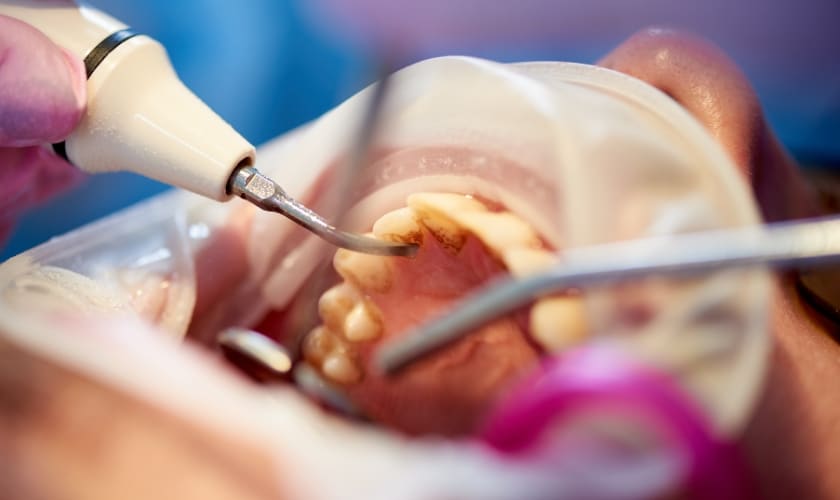Cavities, or tooth decay, are small holes that form in the teeth. There is no natural way to remove them at home; only a dentist can repair a cavity by filling it. However, proper home care can prevent deep cavities from developing.
Plaque is a sticky film that forms on the surface of teeth and along the gumline due to food and bacteria buildup. When a person eats, bacteria in the plaque, such as Streptococcus mutans, produce acids that can cause deep cavities. Suppose a person or dentist does not remove plaque. In that case, it can lead to tooth decay, gum infections (gingivitis), and the destruction of the bone supporting the teeth, eventually resulting in tartar formation.
Plaque tends to accumulate more easily in certain areas, including:
- Cracks, pits, and grooves in the teeth
- Spaces between the teeth
- Around fillings, especially if they are chipped or broken
- Close to the gum line
What are cavities?
Cavities, also known as tooth decay or caries, are holes that form in teeth when acids break down their hard surface.
Tooth decay begins at the tooth’s surface, and the outer layer called the enamel. Over time, it progresses to the tooth’s inner layer, known as the dentin. At this point, a cavity begins to develop.
In the first stage, the tooth loses minerals (demineralization), which appear as white spots. At this stage, the decay has damaged the enamel but has not yet reached the dentin. However, once the decay advances to the dentin, professional dental treatment is required.
| Pre-cavity | Cavity |
| Damaged enamel | Damaged enamel and dentin |
| Reversible | Irreversible |
| No holes, visible white spots | Presence of holes |
| Usually not painful | Painful |
According to the World Health Organization (WHO), dental cavities are the most common noncommunicable disease in the world. In America, 1 in 4 adults lives with untreated tooth decay.
Can a person get rid of cavities at home?
Deep cavities require professional treatment by dentists. However, several home remedies can strengthen tooth enamel to reverse early demineralization and prevent tooth decay. This process, known as remineralization, prevents deep cavities from forming.
Good oral hygiene, including regular brushing, flossing, and dental cleanings, can prevent and reverse cavities. Using fluoride is a tried and tested way to prevent decay and cavities, as advised by Dr. Peter Truong Vo, a trusted Haltom City dentist. High-fluoride toothpaste or direct fluoride application helps remineralize tooth enamel and prevent cavities.
A study indicates that high-fluoride toothpaste is more effective at preventing caries than toothpaste with low fluoride content. The study also found that sodium fluoride mouth rinse is the most effective self-applied fluoride method.
Many U.S. cities and towns have recognized the importance of fluoride. For over 75 years, community water fluoridation has been embraced as a cost-effective strategy, reducing tooth decay by 25 percent in children and adults.
Some people prefer natural home remedies over products containing fluoride. Here are some home remedies to prevent tooth cavities.
1. Oil pulling
Oil pulling originated in an ancient system of alternative medicine called Ayurveda. It involves swishing a tablespoon of sesame or coconut oil around the mouth for about 20 minutes, then spitting it out.
While some claims about oil pulling are not scientifically validated, research indicates that it can improve tooth health. A trusted source noted that it reduces bacteria in the mouth, plaque, and inflammation in the gums.
Some studies suggest that oil pulling with coconut oil might help improve dental health and oral hygiene. However, researchers noted that further studies are needed to determine the effectiveness of the practice.
2. Aloe vera
Aloe vera tooth gel may help fight off bacteria that cause deep cavities. Its antibacterial effect prevents the buildup of bacteria in the mouth, according to a study.
A study found that using aloe vera with tea tree oil is an effective cavity disinfectant, yielding comparable results to traditional disinfectants like chlorhexidine.
While more research is needed, aloe vera’s antibacterial properties may help reduce dental cavities by reducing harmful bacteria in the mouth.
3. Avoid phytic acid
Some people believe that phytic acid, considered an antinutrient, contributes to tooth decay because it hinders the absorption of minerals like iron, zinc, and calcium, affecting their bioavailability.
There is a belief that eliminating phytic acid from the diet can prevent tooth decay and cavities. Phytic acid is most commonly found in cereals and legumes, including:
- Maize
- Wheat
- Rice
- Rye
- Kidney beans
- Haricot beans
- Pinto beans
- Navy beans
- Black-eyed beans
- Broad beans
However, food industries have taken measures to reduce the phytic acid content in these foods to enhance the bioavailability of micronutrients, according to research published in 2015.
While the antinutrient properties of phytic acid are scientifically proven, there is no research specifically regarding its effects on the minerals in tooth enamel.
4. Vitamins and minerals
Minerals like calcium, phosphorus, and magnesium are essential for the structure of our teeth. Vitamin D plays a crucial role in:
- Forming healthy teeth
- Protecting against dental caries
- Releasing calcium in the saliva to mineralize tooth enamel
An article indicated that inadequate mineral intake can lead to absorption problems, an increased tendency to bleed, and tooth loss.
Vitamin D is also vital for oral health as it delays the onset and progression of dental cavities. A study found that children with dental caries had lower vitamin D levels in their blood and low calcium levels in their saliva.
Furthermore, taking vitamin D without magnesium can lead to a soft enamel, which is unable to resist the acids in the mouth, resulting in tooth decay.
5. Avoid sugary foods and drinks
Diet, especially the consumption of free sugars, is one of the leading causes of cavities. When sugar mixes with bacteria in the mouth, it forms an acid that wears down tooth enamel.
The World Health Organization (WHO) recommends limiting the intake of free sugars. Additionally, a study found that consuming free sugars before bedtime increases the risk of dental caries.
6. Eat licorice root
Licorice root extract has emerged as a potential weapon in the fight against cavities. Research suggests it possesses antibacterial properties that target Streptococcus mutans (S. mutans), the bacteria that play a key role in tooth decay. Studies have even shown that licorice extract’s antibacterial effects might be comparable to, or even stronger than, some common mouthwashes. One study found it to be as effective as chlorhexidine mouthwash, while another indicated it surpassed fluoride mouthwash in its potency against cavity-causing bacteria.
7. Sugar-free gum
Chewing sugar-free gum after meals might be a helpful strategy for strengthening your tooth enamel. A study suggests that doing so can reduce the levels of bacteria that damage enamel. With fewer of these harmful bacteria present, your tooth enamel may become stronger and more resistant to decay.
8. Eggshell
Eggshells might offer a two-pronged attack against cavities: remineralization and plaque removal. The calcium in eggshells is similar to what makes up tooth enamel, so some theories suggest it could help rebuild weakened enamel. Additionally, the eggshell’s abrasive texture might be useful for scrubbing away plaque, the sticky film that harbors cavity-causing bacteria. While there’s some promise, it’s important to note that studies on using eggshells directly for oral care are limited. One interesting area of research involves modified eggshells with titanium oxide, which showed promise in protecting teeth from acidic substances that contribute to decay. However, more research is needed before recommending eggshells as a mainstream oral care method.
Prevention
Maintaining good oral hygiene is your best defense against cavities. Brushing twice daily with a high-fluoride toothpaste removes plaque and strengthens tooth enamel. Limiting sugary foods and drinks reduces the fuel source for cavity-causing bacteria. Regular dental checkups allow dentists to detect and treat pre-cavities before they become full-blown cavities. While home remedies might be helpful in the very early stages of decay (pre-cavities), they shouldn’t replace proper oral hygiene and professional dental care.
When to contact a dentist?
While home remedies may help prevent deep cavities or address very early signs of damage (pre-cavities), they are no substitute for professional dental care. Regular dental checkups are crucial because cavities don’t always cause pain. During a checkup, your dentist can detect cavities early and recommend preventive measures like sealants or fluoride treatments. If a cavity is more advanced, they can provide fillings, crowns, or other treatments to restore your tooth health. Remember, brushing with a high-fluoride toothpaste is a key part of your at-home dental care routine, but it should always be combined with regular dental visits.





